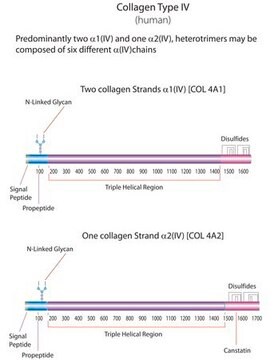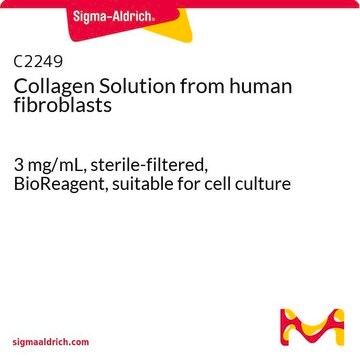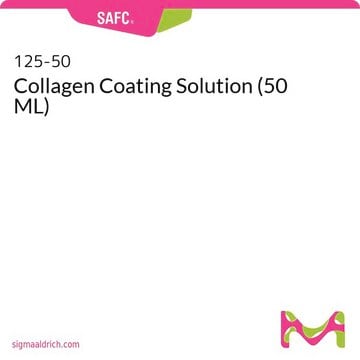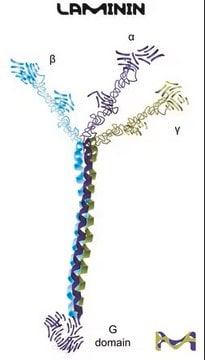C6745
Human Collagen Type IV
from human cell culture, liquid, 0.3 mg/mL, suitable for cell culture
About This Item
Productos recomendados
product name
Collagen Type IV from human cell culture, Bornstein and Traub Type IV, 0.3 mg/mL, sterile-filtered, BioReagent, suitable for cell culture
biological source
human cell culture
Quality Level
sterility
sterile-filtered
product line
BioReagent
form
solution
mol wt
170—180 kDa
packaging
pkg of 1 mL
concentration
0.3 mg/mL
technique(s)
cell culture | mammalian: suitable
surface coverage
6‑10 μg/cm2
impurities
HBSAG, none detected
HCV, none detected
HIV-1/HIV-2, none detected
NCBI accession no.
UniProt accession no.
binding specificity
Peptide Source: Laminin
Peptide Source: Nidogen
shipped in
dry ice
storage temp.
−20°C
Gene Information
human ... COL4A1(1282)
General description
Collagen IV is a heterotrimeric molecules containing two α1-like and one α2-like chain. It is considered essential for completion of embryogenesis and is necessary for proper tissue organization and structural integrity. It is used in vitro as a substrate to enhance adherence and proliferation of many cell types. Produced by human fibroblasts and epithelial cells, Collagen IV is then purified biochemically and provided as a sterile solution at a concentration of 0.3mg/ml in 25% acetic acid.
Application
Biochem/physiol Actions
Features and Benefits
- This Collagen Type IV product is generated by human fibroblasts and epithelial cells in a co-culture system, which produces an ECM in vitro.
- The Collagen Type IV is then purified biochemically.
- It is sterilized by dialysis in an acetic acid and 0.5% chloroform solution and is supplied sterile at a concentration of ~0.3 mg/ml in 25% acetic acid.
Storage Class
11 - Combustible Solids
wgk_germany
WGK 1
flash_point_f
Not applicable
flash_point_c
Not applicable
ppe
Eyeshields, Gloves, type N95 (US)
Certificados de análisis (COA)
Busque Certificados de análisis (COA) introduciendo el número de lote del producto. Los números de lote se encuentran en la etiqueta del producto después de las palabras «Lot» o «Batch»
¿Ya tiene este producto?
Encuentre la documentación para los productos que ha comprado recientemente en la Biblioteca de documentos.
Los clientes también vieron
Artículos
Extracellular matrix proteins such as laminin, collagen, and fibronectin can be used as cell attachment substrates in cell culture.
Extracellular matrix proteins such as laminin, collagen, and fibronectin can be used as cell attachment substrates in cell culture.
Extracellular matrix proteins such as laminin, collagen, and fibronectin can be used as cell attachment substrates in cell culture.
Extracellular matrix proteins such as laminin, collagen, and fibronectin can be used as cell attachment substrates in cell culture.
Nuestro equipo de científicos tiene experiencia en todas las áreas de investigación: Ciencias de la vida, Ciencia de los materiales, Síntesis química, Cromatografía, Analítica y muchas otras.
Póngase en contacto con el Servicio técnico
